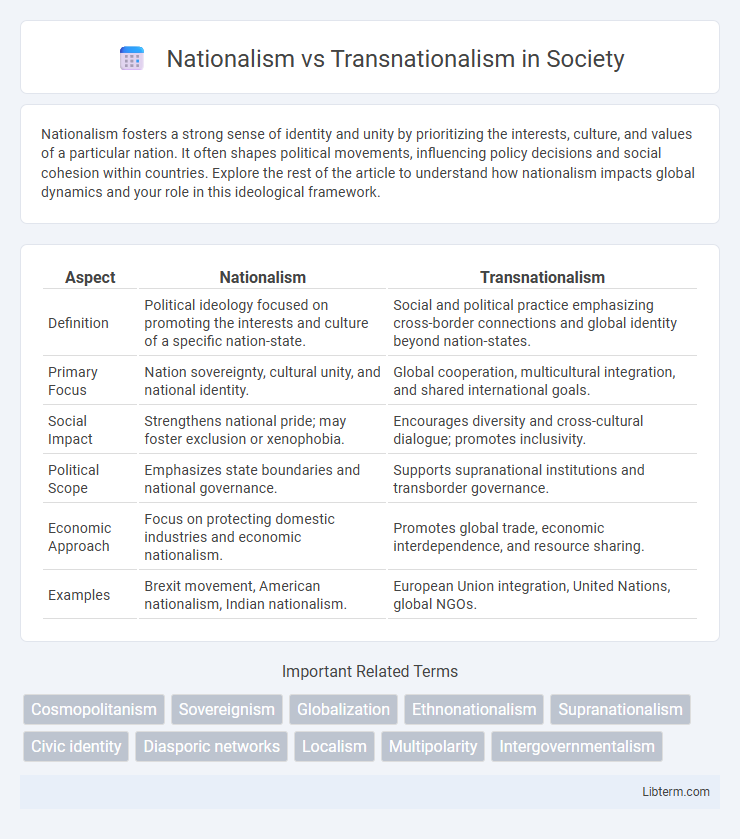Nationalism fosters a strong sense of identity and unity by prioritizing the interests, culture, and values of a particular nation. It often shapes political movements, influencing policy decisions and social cohesion within countries. Explore the rest of the article to understand how nationalism impacts global dynamics and your role in this ideological framework.
Table of Comparison
| Aspect | Nationalism | Transnationalism |
|---|---|---|
| Definition | Political ideology focused on promoting the interests and culture of a specific nation-state. | Social and political practice emphasizing cross-border connections and global identity beyond nation-states. |
| Primary Focus | Nation sovereignty, cultural unity, and national identity. | Global cooperation, multicultural integration, and shared international goals. |
| Social Impact | Strengthens national pride; may foster exclusion or xenophobia. | Encourages diversity and cross-cultural dialogue; promotes inclusivity. |
| Political Scope | Emphasizes state boundaries and national governance. | Supports supranational institutions and transborder governance. |
| Economic Approach | Focus on protecting domestic industries and economic nationalism. | Promotes global trade, economic interdependence, and resource sharing. |
| Examples | Brexit movement, American nationalism, Indian nationalism. | European Union integration, United Nations, global NGOs. |
Defining Nationalism and Transnationalism
Nationalism emphasizes the sovereignty and distinct identity of a nation-state, promoting loyalty and cultural unity within established political boundaries. Transnationalism transcends these boundaries by fostering connections and interactions among people, organizations, and governments across multiple nations, emphasizing global cooperation and shared interests. Defining these concepts requires understanding nationalism as rooted in territorial loyalty and transnationalism as fluid networks that operate beyond the confines of a single nation.
Historical Evolution of Nationalist Movements
Nationalist movements historically emerged in the 18th and 19th centuries during the decline of empires, fueled by the rise of romanticism and Enlightenment ideas emphasizing self-determination and cultural identity. The Treaty of Westphalia in 1648 laid the groundwork for modern nation-states, but nationalist waves surged with events like the French Revolution and the unification of Germany and Italy. Throughout the 20th century, decolonization and global conflicts further transformed nationalism into diverse forms, challenging and sometimes opposing transnational integration efforts such as the European Union and the United Nations.
The Rise of Transnational Ideologies
The rise of transnational ideologies reflects increasing global interconnectedness and the diminishing influence of traditional nationalism in addressing cross-border issues like climate change, human rights, and economic inequality. Transnationalism emphasizes collaboration beyond state boundaries, fostering networks of activism, governance, and cultural exchange that challenge nation-state sovereignty. This shift is driven by globalization, digital communication, and multinational institutions promoting shared values and collective problem-solving on an international scale.
Key Theories Explaining Nationalism and Transnationalism
Key theories explaining nationalism include primordialism, which views nations as ancient, natural entities rooted in shared ethnicity and culture, and modernism, emphasizing nationalism as a product of modern social, political, and economic developments. Ethno-symbolism bridges these perspectives by highlighting the role of myths, symbols, and historical memories in forming national identity. Transnationalism theory focuses on the interconnectedness of individuals and groups across national borders, emphasizing social, economic, and political networks that transcend sovereign states, as seen in diaspora communities and global migration patterns.
National Identity in a Globalized World
National identity in a globalized world faces challenges as nationalism emphasizes the preservation of distinct cultural, historical, and political traits within a nation-state, fostering social cohesion and sovereignty. Transnationalism, by contrast, promotes interconnectedness and fluid identities across borders, driven by migration, communication technologies, and economic integration. The tension between maintaining national identity and embracing global interconnectedness reflects evolving dynamics where local traditions and global influences continuously reshape collective senses of belonging.
Political Impacts: Sovereignty vs. Supranational Governance
Nationalism emphasizes the protection of state sovereignty, advocating for political decisions rooted in national interests and preserving borders and cultural identity. Transnationalism promotes supranational governance structures like the European Union, which facilitate policy coordination, economic integration, and collective security beyond individual nation-states. The tension between these paradigms influences global diplomacy, challenges traditional state authority, and shapes debates on immigration, trade, and international law enforcement.
Economic Globalization and the Challenge to National Borders
Economic globalization intensifies the tension between nationalism and transnationalism by eroding traditional national borders through the rapid flow of capital, goods, and information across countries. Transnational corporations and trade agreements challenge state sovereignty, forcing nations to adapt policies that balance national interests with global economic integration. This dynamic reshapes the concept of borders, turning them into flexible zones of economic exchange rather than rigid barriers, thereby questioning the efficacy of nationalist protectionism in a deeply interconnected global market.
Cultural Dynamics: Preservation vs. Hybridization
Nationalism emphasizes cultural preservation by promoting traditional values, local languages, and heritage as key identity markers. Transnationalism fosters cultural hybridization, encouraging the blending and exchange of diverse cultural elements across borders to create new, dynamic identities. This tension shapes global cultural landscapes, influencing social cohesion and identity politics in an increasingly interconnected world.
Social Movements and the Role of Diasporas
Social movements rooted in nationalism often emphasize preserving cultural identity and sovereignty, seeking political and social change within national boundaries. Transnationalism transcends these borders by connecting diasporas to multiple homelands, fostering global networks that advocate for shared causes, such as human rights or environmental justice. Diasporas act as crucial agents in these movements, leveraging cross-border ties to mobilize resources, influence policymaking, and sustain cultural solidarity beyond a single nation-state.
Future Prospects: Balancing Nationalism and Transnationalism
Future prospects in balancing nationalism and transnationalism involve fostering cooperative frameworks that respect national sovereignty while encouraging global integration. Emerging technologies and international institutions play critical roles in mediating this balance by promoting shared economic growth and addressing transboundary challenges such as climate change. This dynamic requires adaptive governance models capable of harmonizing local identities with global interconnectedness.
Nationalism Infographic

 libterm.com
libterm.com